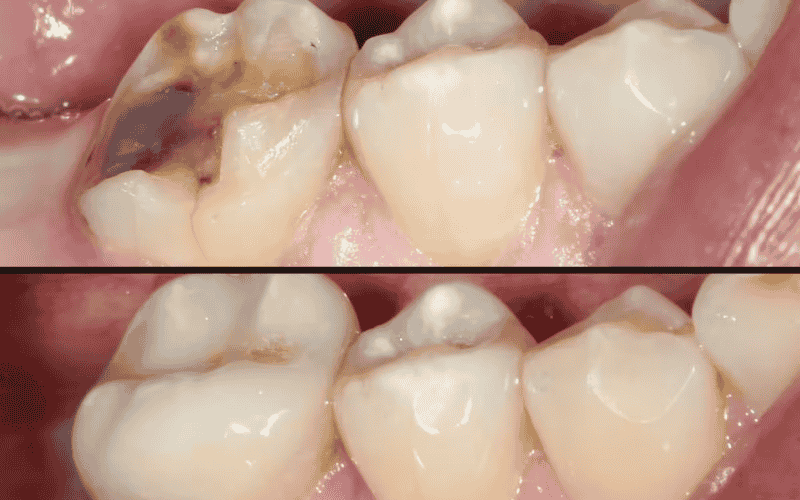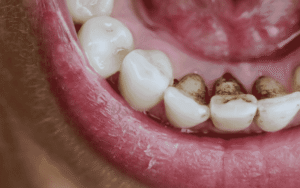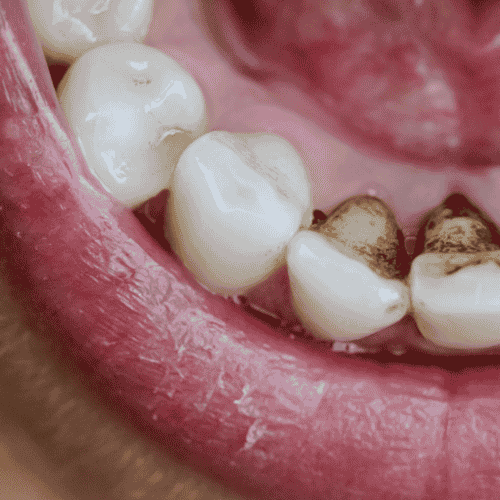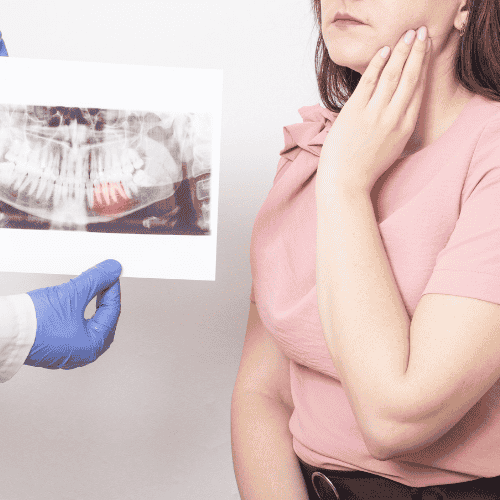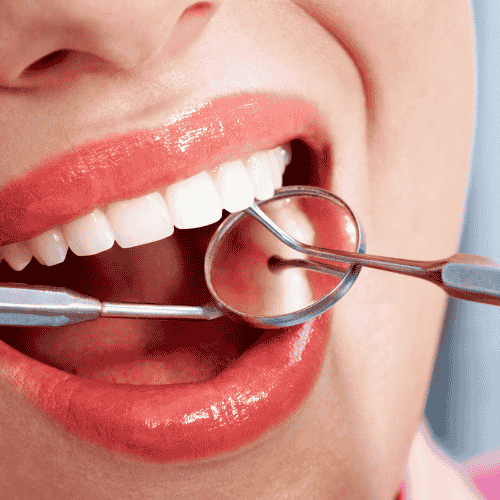Rotten Teeth: Causes, Symptoms, and Treatment Options
How do you fix rotten teeth? Rotten teeth can be fixed by visiting a dentist who will assess the severity of the decay. Treatment options include fillings for cavities, root canals for infected teeth, and crowns to restore damaged teeth. In some cases, if the decay is too severe, tooth extraction may be necessary.
Millions of individuals suffer from rotten teeth, or tooth decay. Bacteria attack tooth enamel, causing cavities, pain, and infection. Rotten bad teeth and bad rotten teeth are painful and offensive but they may be controlled and treated. If you see dental decay, act promptly. To manage and cure rotting teeth or a rotted tooth, we’ll discuss causes, symptoms, and treatment choices.
What Are Rotten Teeth and How Do They Develop?
Untreated tooth decay causes rotten teeth. Sugar-feeding oral bacteria create acids that damage tooth enamel. This slow process causes cavities, which may develop if ignored. Decaying teeth are fragile, brittle, and sensitive to heat, cold, and pressure, in addition to discolouration, holes, and fissures.
Untreated tooth decay causes rotten teeth. Sugar-feeding oral bacteria create acids that damage tooth enamel. This slow process causes cavities, which may develop if ignored. Decaying teeth, rotton teeth (common misspelling), rotting tooth, and rotted teeth are fragile, brittle, and sensitive to heat, cold, and pressure, in addition to discolouration, holes, and fissures.
Plaque forms on teeth when food, germs, and saliva mix together. If you don’t brush and floss well enough, plaque can turn into tartar, which can hurt the structure of your teeth. When decay spreads deeper into the tooth, it can damage the pulp, which can cause pain, infection, and other problems. To stop tooth decay and keep your mouth healthy, you need to get treatment early and often.
Main Causes of Rotten Teeth and Tooth Decay
Rotten teeth may arise from untreated dental decay and dangerous microorganisms on the teeth and gums. Poor oral hygiene causes plaque, a sticky film of germs, to build up on teeth. These bacteria produce acids from sugars and starches in meals, wearing away tooth enamel. Decay may damage tooth structure and cause cavities or “rotten” teeth.
A number of reasons cause tooth decay:
- Poor Oral Hygiene: Poor brushing and flossing cause plaque to solidify and cause cavities and gum disease.
- High sugary and starchy diets, along with acidic drinks, worsen tooth decay by fuelling microorganisms that create decay-causing acids.
- Dry Mouth: Reduced saliva flow raises decay risk by neutralising acids and removing food particles.
- Tobacco Use: Smoking or chewing tobacco may cause plaque buildup, increasing the risk of cavities and gum disease.
- Skipping routine dental appointments: Early diagnosis and treatment of cavities prevents more serious concerns.
These causes explain why people search terms such as rotten front teeth, rotten bottom teeth, rotten back tooth, and all my teeth are rotten.
Common Signs and Early Symptoms of Tooth Rot
It’s important to get your teeth checked regularly because tooth decay can start without any rotten tooth symptoms. As the decay gets worse, some signs may show up. If you notice these early signs, you might be able to fix the problem before it gets worse. Here are some common signs to know what does rotten teeth look like:
- Biting causes toothache or pain: Chewing or biting pain may suggest a cavity or tooth injury; many ask do rotten teeth hurt.
- Increased sensitivity to hot, cold, or sweet meals: May indicate enamel erosion or early tooth disease.
- Discolouration: Spots on the tooth surface, such as brown, black, yellow, or white, may suggest decay.
- Bad Breath: A chronic poor taste or foul breath may be caused by bacterial buildup from rotting terrible teeth.
- Swelling gums: Rotting teeth gums swelling may suggest infection or abscess.
If you notice any of these early signs of rotting teeth, you should make an appointment with the dentist right away. Early tooth decay treatment gives you a better chance of keeping your tooth and stops it from getting worse.
How Rotten Teeth Affect Your Oral and Overall Health
Bad teeth can hurt your overall health and your teeth. Extreme tooth pain is a common symptom that can be very bad. Tooth decay can spread to nearby tissues and gums, causing swelling, abscesses, and bleeding.
Teeth that are rotting hurt and make it hard to chew, which can affect digestion and the body’s ability to absorb nutrients. This could lead to long-term problems with the intestines and malnutrition. Your yellow rotten teeth smile may not look good because of decaying teeth, which can make you feel bad about yourself and make you feel bad. Because rotten teeth hurt your body and mind, it’s important to get treatment as soon as possible.
Effective Ways to Fix and Restore Rotten Teeth
The degree of decay determines tooth decay treatments. Early tooth decay detection increases the likelihood of less intrusive treatment. As decay advances, more extensive operations may be needed. Here are some popular decaying tooth restoration options:
- Fillings: Early decay may be treated with fillings, which can be made of silver amalgam, composite resin, or porcelain. Silver amalgam is durable and affordable, but composite and porcelain complement your teeth better.
- Crowns: For severe decay compromising tooth structure, a crown may be required. To restore the tooth’s form, strength, and function, a porcelain, gold, or resin crown is put over the decaying part. Dental crowns are often mentioned alongside tooth crowns and in searches for how to fix rotting teeth.
- Root Canal: If decay reaches the tooth’s pulp and causes infection, a root canal operation is necessary. After removing the infectious tissue, the tooth is cleaned, filled, and sealed, frequently with a crown.
- Tooth Extraction: When a tooth is too damaged to heal, extraction may be essential to avoid infection. This generally happens when the tooth is irreparable and threatens oral health. People ask about cavity in between teeth treatment; sometimes extraction is the last resort.
- Implants and Dentures: Fill the gap left by tooth extraction with dental implants or dentures. An implant is surgically implanted into the jawbone and crowned to look like a tooth. Dentures restore function and appearance by replacing lost teeth.
If you’re asking can rotten teeth be fixed, the answer is often yes; depending on severity (fillings, crowns, root canal, implant). But in advanced cases tooth extraction may be required.
Professional Dental Treatments for Rotten Teeth
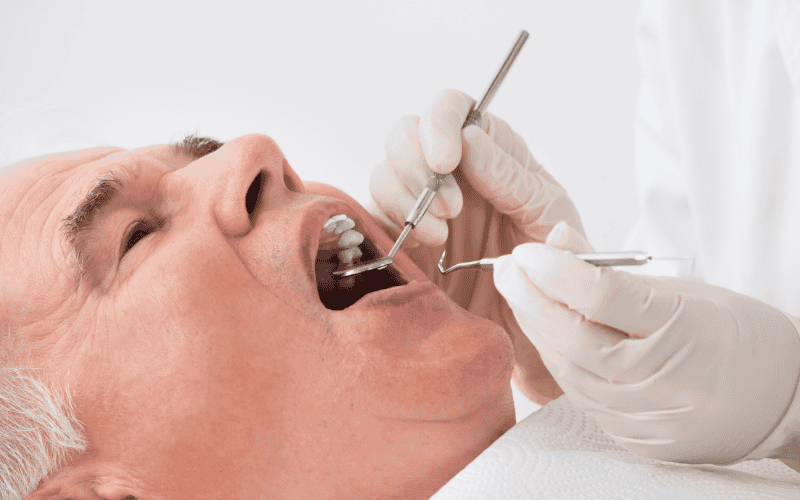
Tooth decay is common, but early detection may prevent and cure it. Rotten teeth cause pain, sensitivity, and discomfort when eating, and if left untreated, the decay may progress and create serious issues. Fortunately, modern dentistry provides several dental health restoration choices.
Treatment Options for Rotten Teeth:
- Fillings: The decaying tooth is removed and filled by your dentist for cavities or early decay. Depending on decay location and severity, composite resin or silver amalgam may be employed. People searching for tooth fillings, how to get rid of cavities, or how to fix bad teeth will commonly be offered this.
- Dental Crowns: If your tooth is badly decayed or broken, you may need a crown to protect it. This brings back the tooth’s function and appearance, making it strong and long-lasting.
- Root Canal: If decay gets to the pulp of the tooth, a root canal may be needed to remove the infected tissue. After the dentist seals the tooth and gets rid of the infection, they may put on a crown.
- Tooth Extraction: If the tooth is very rotten and can’t be fixed, it may be necessary to avoid getting an infection. After teeth are pulled, dental implants or bridges can take their place.
- Fluoride Treatments: Fluoride treatments can help repair tooth enamel in the early stages of decay and stop more damage from happening. People with early-stage tooth decay can benefit from this.
- Silver Diamine Fluoride: Is a treatment that doesn’t hurt and can help people with special needs or young people stop decay and stop more damage from happening.
Teeth Implants Turkey offers personalised treatments for decaying teeth. Our experts will look at the damage and recommend the best way to fix your smile and health using our expert dentist in Turkey.
Home Care Tips and Preventive Measures Against Tooth Decay
Tooth decay is prevalent, but good dental hygiene and lifestyle choices may prevent it. You can avoid tooth decay and have a healthy smile for years by following these tips.
- Brush Your Teeth Twice a Day: brush teeth with fluoride toothpaste for two minutes, covering all surfaces to eliminate plaque and food particles. Regular brushing prevents decay-causing germs and helps avoid smooth surface cavity formation.
- Floss daily: Cleaning between your teeth is just as important as brushing. Flossing with water or dental floss gets rid of food and dirt from places your toothbrush can’t reach, which helps prevent cavities and gum disease.
- Avoid Sugary and Starchy Foods: When you eat these things, the bacteria in your mouth make acids that eat away at tooth enamel. Cut back on drinks, processed foods, and sugary snacks. Drink water to wash your mouth and make saliva, which neutralises acids.
- Visit Your Dentist Regularly: You should go to the dentist at least twice a year for checkups and cleanings. Your dentist can find and treat early tooth decay, smooth surface cavities, and different types of cavities, so you don’t have to have more complicated surgeries.
You can greatly reduce tooth decay and keep your mouth healthy by following these simple but effective home care tips. If you have signs of decay, you should see your dentist right away to get the best options for restoring your smile.
When to See a Dentist for Rotten Teeth
If you suspect rotting teeth, my teeth are rotting, or have tooth decay symptoms, consult a dentist immediately. Early treatment may avoid future damage and complicated treatments. Signs you should visit a dentist:
- If your tooth pain is constant or throbbing, especially when you chew or bite, it means that the decay is deeper.
- Sensitivity to temperature: If you become more sensitive to hot, cold, or sweet foods, it could mean that your enamel is wearing away.
- If you have holes, pits, or discolouration (brown, black, or yellow patches) on your teeth, you should see a dentist.
- Having bad breath or a bad taste in your mouth could mean you’re sick or that bacteria are building up from decay.
- When brushing or flossing, gums may swell, turn red, or bleed because of tooth decay or infection.
- If tooth discomfort hinders chewing or opening your mouth, it may suggest decay affecting the tooth structure or surrounding tissues.
If you’ve searched are my teeth rotting, i have a rotten tooth, a rotten tooth, signs your teeth are rotting, or signs of a rotten tooth, the above signs are key reasons to see a dentist.



